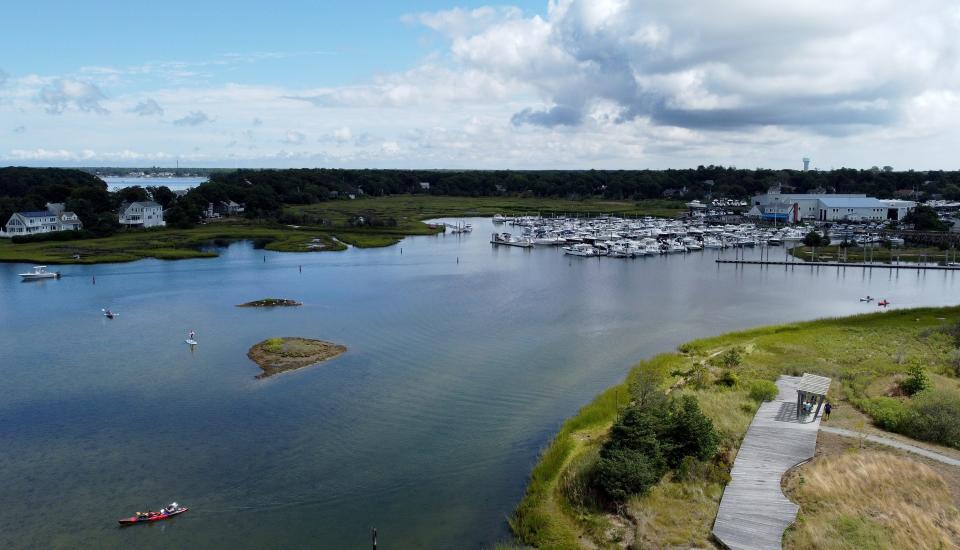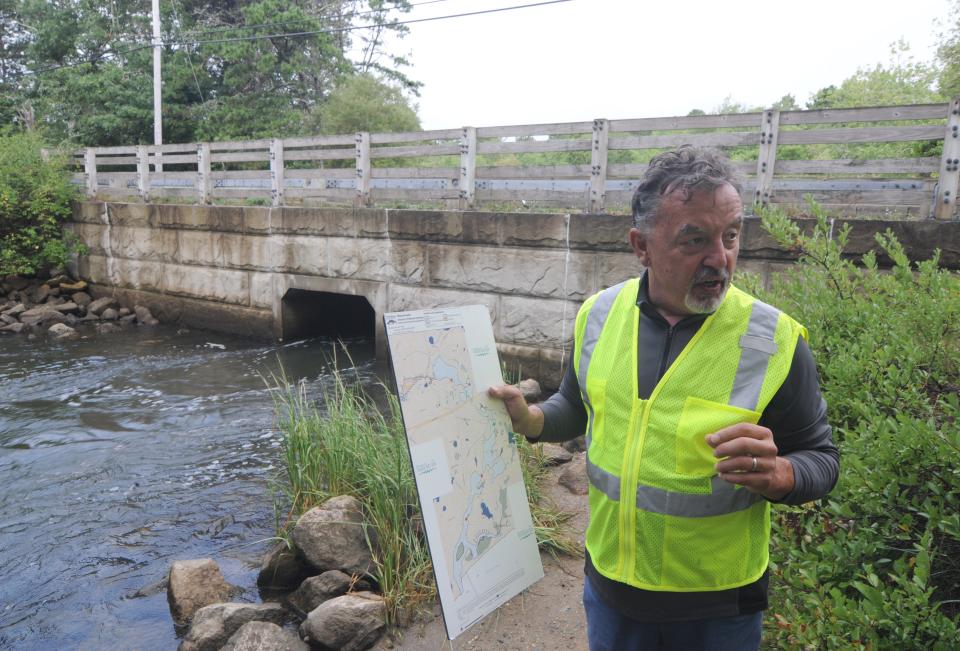State's proposed nitrogen regulations put a tight deadline on Cape wastewater management
DENNIS — The clock is running out as proposed changes targeting nitrogen contamination from the state could put a tight deadline on the Cape's approach to wastewater management.
Leadership from the Massachusetts Department of Environmental Protection discussed the new regulations — anticipated to be finalized soon after the new year — at an Aug. 23 Dennis Select Board Meeting.
More: Orleans will take its plan to prohibit fertilizer to town meeting voters
State involvement also means opportunity for Cape Codders like Rick Bishop, executive director of Friends of Bass River, an organization working to improve the water quality of the Bass River Estuarine System.
"Nitrogen is the one that everyone talks about, and we monitor that very closely," he said.
The state agrees.
The primary water quality problem on Cape Cod comes from nitrogen contamination, Martin Suuberg, the Department of Environmental Protection's commissioner, wrote in a June 1 letter to the Dennis Select Board.
"Nitrogen from septic systems, wastewater treatment plants, lawns and stormwater leaches into groundwater and flows underground and is discharged to surface water bodies," he said in the letter.
Most nitrogen leakage comes from on-site septic systems, Suuberg said, which contribute approximately 85% of the wastewater flow into Cape Cod's embayments.
High levels of nitrogen are environmentally harmful, and can lead to the degradation of any body of water's ecosystem due to increased algae and fungi production, killing plants and fish.
More: Cyanobacteria in some Cape Cod waters can make you sick. What you need to know.
What's going to change?
The state is proposing a new designation to existing Title 5 laws to establish "nitrogen sensitive areas" for watersheds that drain into estuaries subject to an EPA-approved "total maximum daily load" limitation of nitrogen.
There are currently 30 watersheds on Cape Cod that are going to be subject to these new regulations, three of which Dennis contributes to — the Herring River, Bass River and Swan Pond estuary systems.

Towns with on-site septic systems contributing nitrogen to the EPA-regulated watersheds must upgrade with enhanced nitrogen treatment systems within five years of the regulation's finalization, Milly Garcia-Serrano, director of the Department's Southeast Regional Office told the board at the Aug. 23 meeting.
More: Bourne creating plan to improve septic systems, protect watersheds
These enhanced nitrogen treatment systems must demonstrate the lowest nitrogen levels in their effluence, she added.
The new framework encourages towns to utilize "best available nitrogen reduction technology,” a broad term encompassing various non-traditional methods besides the usual response of sewering — including permeable reactive barriers filled with wood chips, which remove nitrogen from groundwater as it flows through, Gerard Martin, a member of the Department's Southeast Regional leadership team, said on Aug. 23.
Encouraging collaboration
Towns can apply, however, for a "watershed permit," which extends the deadline for system upgrades from five years to 20 years, allowing some flexibility in their approach and a chance to work with the department one-on-one in their implementation, Garcia-Serrano said.
The department is encouraging Cape towns to combine traditional and non-traditional methods of addressing nitrogen contamination, and hopes the watershed permit option will spur collaboration.
"We've seen sewering in some areas and not in others, there are a bunch of different things to do to address the nitrogen," Martin said.
More: Here's how to kick the fertilizer habit and protect Cape Cod waters
To get a watershed permit, the town must apply through the state based on a "Watershed Management Plan," a long-term plan approved by voters at town meeting to address water quality issues, typically based on a Comprehensive or Targeted Watershed Management Plan.
A public comment period of 60 days is also required, and the town may hold a public meeting if they decide one is necessary.
Why the new regulations?
Septic systems and wastewater management have been on the minds of Cape Codders for years, with declining water quality forcing towns to address their wastewater plans in the long-run.
While progress has been made in addressing water contamination, Suuberg said in the June 1 letter, it has largely been sporadic and inconsistent.
More: Cape Cod cyanobacteria report: 9 freshwater ponds on Cape Cod under watch or alerts
With these new regulations, the department hopes to get everyone on the same page regarding nitrogen contamination from septic systems, Garcia-Serrano said on Aug. 23.
"We are focusing on nitrogen because of its connection with septic systems and its impact on the environment," she told the board.

Bishop's group, Friends of Bass River, has been monitoring the water of Bass River and are developing a comprehensive database on the overall health of the system. Although only on its third year, the organization's research points to the same conclusion as the Department of Environmental Protection: nitrogen contamination is a priority issue for the Cape's estuaries.
"It's no surprise that it's (Bass River's water quality) incrementally getting worse, it's not a big step, but the amount of nitrogen is increasing every year," Bishop said. "It's a big concern of ours."
More: Canal outfall, Otis plant tie-in considered by Bourne, Sandwich
The upper Bass River headwaters in particular were identified by the Massachusetts Division of Marine Fisheries as a prohibited area because its water is so unhealthy, he said, with the Department of Environmental Protection putting the needed reduction of that area's nitrogen levels at 73%, and the rest of the river at about 46%.
"The new framework is very exciting and long overdue," Bishop said. "It's no surprise that Title 5s don't really work for nitrogen. They certainly retain solids, but the nitrogen goes right into the sand and into the water, so the fact they're looking into this is very exciting for us."
What does this mean for Dennis?
The three watersheds Dennis contributes nitrogen to — Herring River, Bass River and Swan Pond watersheds — will be subject to the new regulations when they are finalized.
Marybeth Chubb, section chief of the Department of Environmental Protection's Wastewater Management Program, said on Aug. 23 while a more detailed cost analysis is needed, initial estimates put the cost to homeowners where individual septic system upgrades are needed between $20,000 to $35,000 to comply with the new regulations.
Dennis Select Board Chair Chris Lambton wasn't surprised when he saw the proposed regulations.

"There was a lot of information, I'm still kind of digesting everything," he said Wednesday. "For years we've been hearing that the state is going to come back with sewer regulations (for Cape Cod) so I'm thankful our town has been working already to address some of these issues."
Plans for a complete wastewater overhaul have been in the works in Dennis for years, and at this year's town meeting, Dennis voters gave the go-ahead to the first phase of the town's wastewater system overhaul, kicking off the $7.7 million design process of a municipal sewer system and potential treatment plant at 120 Theophilus F. Smith Road.
More: 'The key': Dennis, Yarmouth move forward with wastewater treatment plans
Lambton sees the new regulations as a sign the town is moving in the right direction with a municipal wastewater system.
"I think these new regulations are going to make the people who didn't want the new wastewater plan realize they need wastewater," he said.
One of the issues brought up by those against the municipal wastewater system is the cost to hook up an individual septic system to the town's system, which can run anywhere from $5,000 to $8,000, Lambton said.
But from the estimates discussed at the board meeting, it will be more cost efficient for Dennis residents to join the municipal system rather than pay $20,000 to $35,000 for an upgrade, in Lambton's eyes.
"It's going to be less expensive for everyone in the long run," he said. "And we can retrofit the treatment center to address other contaminants too, like phosphorous or pharmaceuticals."
Sarah Carlon can be reached at: scarlon@capecodonline.com or on Twitter: @sarcarlon
Get the Cape Cod news that matters delivered to your inbox. Sign up for our free newsletters.
This article originally appeared on Cape Cod Times: State DEP rules for nitrogen aimed to protect Cape water quality

